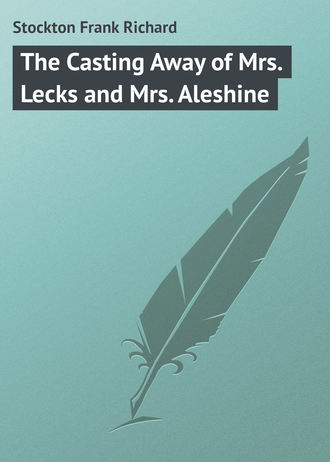 полная версия
полная версияThe Casting Away of Mrs. Lecks and Mrs. Aleshine
"Cold baked beans and lukewarm water ain't exactly company vittles," said Mrs. Aleshine, "but there's many a poor wretch would be glad to get 'em."
I could not imagine any poor wretch who would be glad of the food together with the attending circumstances; but I did not say so.
"The water is just one finger from the bottom of the seat," said Mrs. Lecks, who had been stooping over to measure, "and it's time to put on the life-preservers."
"Very good," said Mrs. Aleshine; "hand me mine."
Each of us now buckled on a life-preserver, and as I did so I stood up upon a thwart and looked about me. It was quite light now, and I could see for a long distance over the surface of the ocean, which was gently rolling in wide, smooth swells. As we rose upon the summit of one of these I saw a dark spot upon the water, just on the edge of our near horizon, "Is that the steamer?" I thought; "and has she not yet sunk?"
At this there came to me a glimmering of courageous hope. If the steamer had remained afloat so long, it was probable that on account of water-tight compartments, or for some other reason, her sinking had reached its limit, and that if we could get back to her we might be saved. But, alas, how were we to get back to her? This boat would sink long, long before I could row that distance.
However, I soon proclaimed the news to my companions, whereupon Mrs. Aleshine prepared to stand upon a thwart and see for herself. But Mrs. Lecks restrained her.
"Don't make things worse, Barb'ry Aleshine," said she, "by tumblin' overboard. If we've got to go into the water, let us do it decently and in order. If that's the ship, Mr. Craig, don't you suppose we can float ourselves to it in some way?"
I replied that by the help of a life-preserver a person who could swim might reach the ship.
"But neither of us can swim," said Mrs. Lecks, "for we've lived where the water was never more'n a foot deep, except in time of freshets, when there's no swimmin' for man or beast. But if we see you swim, perhaps we can follow, after a fashion. At any rate, we must do the best we can, and that's all there is to be done."
"The water now," remarked Mrs. Aleshine, "is so near to the bottom of my seat that I've got to stand up, tumble overboard or no."
"All right," remarked Mrs. Lecks; "we'd better all stand up, and let the boat sink under us. That will save our jumpin' overboard, or rollin' out any which way, which might be awkward."
"Goodness gracious me!" exclaimed Mrs. Aleshine. "You set the oysters creepin' over me again! First you talk of the ship sinkin' under us, and now it's the boat goin' to the bottom under our feet. Before any sinkin' 's to be done I'd ruther get out."
"Now, Barb'ry Aleshine," said Mrs. Lecks, "stand up straight, and don't talk so much. It'll be a great deal better to be let down gradual than to flop into the water all of a bunch."
"Very well," said Mrs. Aleshine; "it may be best to get used to it by degrees; but I must say I wish I was home."
As for me, I would have much preferred to jump overboard at once, instead of waiting in this cold-blooded manner; but as my companions had so far preserved their presence of mind, I did not wish to do anything which might throw them into a panic. I believed there would be no danger from the suction caused by the sinking of a small boat like this, and if we took care not to entangle ourselves with it in any way, we might as well follow Mrs. Lecks's advice as not. So we all stood up, Mrs. Lecks in the stern, I in the bow, and Mrs. Aleshine on a thwart between us. The last did not appear to have quite room enough for a steady footing, but, as she remarked, it did not matter very much, as the footing, broad or narrow, would not be there very long.
I am used to swimming, and have never hesitated to take a plunge into river or ocean, but I must admit that it was very trying to my nerves to stand up this way and wait for a boat to sink beneath me. How the two women were affected I do not know. They said nothing, but their faces indicated that something disagreeable was about to happen, and that the less that was said about it the better.
The boat had now sunk so much that the water was around Mrs. Aleshine's feet, her standing-place being rather lower than ours. I made myself certain that there were no ropes nor any other means of entanglement near my companions or myself, and then I waited. There seemed to be a good deal of buoyancy in the bow and stern of the boat, and it was a frightfully long time in sinking. The suspense became so utterly unendurable that I was tempted to put one foot on the edge of the boat, and, by tipping it, put an end to this nerve-rack; but I refrained, for I probably would throw the women off their balance, when they might fall against some part of the boat, and do themselves a hurt. I had just relinquished this intention, when two little waves seemed to rise one on each side of Mrs. Aleshine, and gently flowing over the side of the boat, they flooded her feet with water.
"Hold your breaths!" I shouted. And now I experienced a sensation which must have been very like that which comes to a condemned criminal at the first indication of the pulling of the drop. Then there was a horrible sinking, a gurgle, and a swash, and the ocean over which I had been gazing appeared to rise up and envelop me.
In a moment, however, my head was out of the water, and, looking hastily about me, I saw, close by, the heads and shoulders of Mrs. Lecks and Mrs. Aleshine. The latter was vigorously winking her eyes and blowing from her mouth some sea-water that had got into it; but as soon as her eyes fell upon me she exclaimed: "That was ever so much more suddint than I thought it was goin' to be!"
"Are you both all right?"
"I suppose I am," said Mrs. Aleshine, "but I never thought that a person with a life-preserver on would go clean under the water."
"But since you've come up again, you ought to be satisfied," said Mrs. Lecks. "And now," she added, turning her face toward me, "which way ought we to try to swim? and have we got everythin' we want to take with us?"
"What we haven't got we can't get," remarked Mrs. Aleshine; "and as for swimmin', I expect I'm goin' to make a poor hand at it."
I had a hope, which was not quite strong enough to be a belief, that, supported by their life-preservers, the two women might paddle themselves along; and that, by giving them in turn a helping hand, I might eventually get them to the steamer. There was a strong probability that I would not succeed, but I did not care to think of that.
I now swam in front of my companions, and endeavored to instruct them in the best method of propelling themselves with their arms and their hands. If they succeeded in this, I thought I would give them some further lessons in striking out with their feet. After watching me attentively, Mrs. Lecks did manage to move herself slowly through the smooth water, but poor Mrs. Aleshine could do nothing but splash.
"If there was anythin' to take hold of," she said to me, "I might get along; but I can't get any grip on the water, though you seem to do it well enough. Look there!" she added in a higher voice. "Isn't that an oar floatin' over there? If you can get that for me, I believe I can row myself much better than I can swim."
This seemed an odd idea, but I swam over to the floating oar, and brought it her. I was about to show her how she could best use it, but she declined my advice.
"If I do it at all," she said, "I must do it in my own way." And taking the oar in her strong hands, she began to ply it on the water very much in the way in which she would handle a broom. At first she dipped the blade too deeply, but, correcting this error, she soon began to paddle herself along at a slow but steady rate.
"Capital!" I cried. "You do that admirably!"
"Anybody who's swept as many rooms as I have," she said, "ought to be able to handle anythin' that can be used like a broom."
"Isn't there another oar?" cried Mrs. Lecks, who had now been left a little distance behind us. "If there is, I want one."
Looking about me, I soon discovered another floating oar, and brought it to Mrs. Lecks, who, after holding it in various positions, so as to get "the hang of it," as she said, soon began to use it with as much skill as that shown by her friend. If either of them had been obliged to use an oar in the ordinary way, I fear they would have had a bad time of it; but, considering the implement in the light of a broom, its use immediately became familiar to them, and they got on remarkably well.
I now took a position a little in advance of my companions, and as I swam slowly they were easily able to keep up with me. Mrs. Aleshine, being so stout, floated much higher out of the water than either Mrs. Lecks or I, and this permitted her to use her oar with a great deal of freedom. Sometimes she would give such a vigorous brush to the water that she would turn herself almost entirely around, but after a little practice she learned to avoid undue efforts of this kind.
I was not positively sure that we were going in the right direction, for my position did not allow me to see very far over the water; but I remembered that when I was standing up in the boat, and made my discovery, the sun was just about to rise in front of me, while the dark spot on the ocean lay to my left. Judging, therefore, from the present position of the sun, which was not very high, I concluded that we were moving toward the north, and therefore in the right direction. How far off the steamer might be I had no idea, for I was not accustomed to judging distances at sea; but I believed that if we were careful of our strength, and if the ocean continued as smooth as it now was, we might eventually reach the vessel, provided she were yet afloat.
"After you are fairly in the water," said Mrs. Aleshine, as she swept along, although without the velocity which that phrase usually implies, "it isn't half so bad as I thought it would be. For one thing, it don't feel a bit salt, although I must say it tasted horribly that way when I first went into it."
"You didn't expect to find pickle-brine, did you?" said Mrs. Lecks. "Though, if it was, I suppose we could float on it settin'."
"And as to bein' cold," said Mrs. Aleshine, "the part of me that's in is actually more comfortable than that which is out."
"There's one thing I would have been afraid of," said Mrs. Lecks, "if we hadn't made preparations for it, and that's sharks."
"Preparations!" I exclaimed. "How in the world did you prepare for sharks?"
"Easy enough," said Mrs. Lecks. "When we went down into our room to get ready to go away in the boats we both put on black stockin's. I've read that sharks never bite colored people, although if they see a white man in the water they'll snap him up as quick as lightnin'; and black stockin's was the nearest we could come to it. You see, I thought as like as not we'd have some sort of an upset before we got through."
"It's a great comfort," remarked Mrs. Aleshine, "and I'm very glad you thought of it, Mrs. Lecks. After this I shall make it a rule: Black stockin's for sharks."
"I suppose in your case," said Mrs. Lecks, addressing me, "dark trousers will do as well."
To which I answered that I sincerely hoped they would.
"Another thing I'm thankful for," said Mrs. Aleshine, "is that I thought to put on a flannel skeert."
"And what's the good of it," said Mrs. Lecks, "when it's soppin' wet?"
"Flannel's flannel," replied her friend, "whether it's wet or dry; and if you'd had the rheumatism as much as I have, you'd know it."
To this Mrs. Lecks replied with a sniff, and asked me how soon I thought we would get sight of the ship; for if we were going the wrong way, and had to turn round and go back, it would certainly be very provoking.
I should have been happy indeed to be able to give a satisfactory answer to this question. Every time that we rose upon a swell I threw a rapid glance around the whole circle of the horizon; and at last, not a quarter of an hour after Mrs. Lecks's question, I was rejoiced to see, almost in the direction in which I supposed it ought to be, the dark spot which I had before discovered. I shouted the glad news, and as we rose again my companions strained their eyes in the direction to which I pointed. They both saw it, and were greatly satisfied.
"Now, then," said Mrs. Aleshine, "it seems as if there was somethin' to work for"; and she began to sweep her oar with great vigor.
"If you want to tire yourself out before you get there, Barb'ry Aleshine," said Mrs. Lecks, "you'd better go on in that way. Now what I advise is that we stop rowin' altogether, and have somethin' to eat; for I'm sure we need it to keep up our strength."
"Eat!" I cried. "What are you going to eat? Do you expect to catch fish?"
"And eat 'em raw?" said Mrs. Lecks. "I should think not. But do you suppose, Mr. Craig, that Mrs. Aleshine and me would go off and leave that ship without takin' somethin' to eat by the way? Let's all gether here in a bunch, and see what sort of a meal we can make. And now, Barb'ry Aleshine, if you lay your oar down there on the water, I recommend you to tie it to one of your bonnet-strings, or it'll be floatin' away, and you won't get it again."
As she said this, Mrs. Lecks put her right hand down into the water, and fumbled about, apparently in search of a pocket. I could not but smile as I thought of the condition of food when, for an hour or more, it had been a couple of feet under the surface of the ocean; but my ideas on the subject were entirely changed when I saw Mrs. Lecks hold up in the air two German sausages, and shake the briny drops from their smooth and glittering surfaces.
"There's nothin'," she said, "like sausages for shipwreck and that kind o' thing. They're very sustainin', and bein' covered with a tight skin, water can't get at 'em, no matter how you carry 'em. I wouldn't bring these out in the boat, because, havin' the beans, we might as well eat them. Have you a knife about you, Mr. Craig?"
I produced a dripping jack-knife, and after the open blade had been waved in the air to dry it a little, Mrs. Lecks proceeded to divide one of the sausages, handing the other to me to hold meanwhile.
"Now don't go eatin' sausages without bread, if you don't want 'em to give you dyspepsy," said Mrs. Aleshine, who was tugging at a submarine pocket.
"I'm very much afraid your bread is all soaked," said Mrs. Lecks.
To which her friend replied that that remained to be seen, and forthwith produced, with a splash, a glass preserve-jar with a metal top.
"I saw this nearly empty, as I looked into the ship's pantry, and I stuffed into it all the soft biscuits it would hold. There was some sort of jam left at the bottom, so that the one who gets the last biscuit will have somethin' of a little spread on it. And now, Mrs. Lecks," she continued triumphantly, as she unscrewed the top, "that rubber ring has kept 'em as dry as chips. I'm mighty glad of it, for I had trouble enough gettin' this jar into my pocket, and gettin' it out, too, for that matter."
Floating thus, with our hands and shoulders above the water, we made a very good meal from the sausages and soft biscuit.
"Barb'ry Aleshine," said Mrs. Lecks, as her friend proceeded to cut the second sausage, "don't you lay that knife down, when you've done with it, as if 't was an oar; for if you do it'll sink, as like as not, about six miles. I've read that the ocean is as deep as that in some places."
"Goodness gracious me!" exclaimed Mrs. Aleshine, "I hope we are not over one of them deep spots."
"There's no knowin'," said Mrs. Lecks, "but if it's more comfortin' to think it's shallerer, we'll make up our minds that way. Now, then," she continued, "we'll finish off this meal with a little somethin' to drink. I'm not given to takin' spirits, but I never travel without a little whisky, ready mixed with water, to take if it should be needed."
So saying, she produced from one of her pockets a whisky-flask tightly corked, and of its contents we each took a sip, Mrs. Aleshine remarking that, leaving out being chilled or colicky, we were never likely to need it more than now.
Thus refreshed and strengthened, Mrs. Lecks and Mrs. Aleshine took up their oars, while I swam slightly in advance, as before. When, with occasional intermissions of rest, and a good deal of desultory conversation, we had swept and swam for about an hour, Mrs. Lecks suddenly exclaimed: "I can see that thing ever so much plainer now, and I don't believe it's a ship at all. To me it looks like bushes."
"You're mighty long-sighted without your specs," said Mrs. Aleshine, "and I'm not sure but what you're right."
For ten minutes or more I had been puzzling over the shape of the dark spot, which was now nearly all the time in sight. Its peculiar form had filled me with a dreadful fear that it was the steamer, bottom upward, although I knew enough about nautical matters to have no good reason to suppose that this could be the case. I am not far-sighted, but when Mrs. Lecks suggested bushes, I gazed at the distant object with totally different ideas, and soon began to believe that it was not a ship, either right side up or wrong side up, but that it might be an island. This belief I proclaimed to my companions, and for some time we all worked with increased energy in the desire to get near enough to make ourselves certain in regard to this point.
"As true as I'm standin' here," said Mrs. Lecks, who, although she could not read without spectacles, had remarkably good sight at long range, "them is trees and bushes that I see before me, though they do seem to be growin' right out of the water."
"There's an island under them; you may be sure of that!" I cried. "Isn't this ever so much better than a sinking ship!"
"I'm not so sure about that," said Mrs. Aleshine. "I'm used to the ship, and as long as it didn't sink I'd prefer it. There's plenty to eat on board of it, and good beds to sleep on, which is more than can be expected on a little bushy place like that ahead of us. But then, the ship might sink all of a suddint, beds, vittles, and all."
"Do you suppose that is the island the other boats went to?" asked Mrs. Lecks.
This question I had already asked of myself. I had been told that the island to which the captain intended to take his boats lay about thirty miles south of the point where we left the steamer. Now I knew very well that we had not come thirty miles, and had reason to believe, moreover, that the greater part of the progress we had made had been toward the north. It was not at all probable that the position of this island was unknown to our captain; and it must, therefore, have been considered by him as an unsuitable place for the landing of his passengers. There might be many reasons for this unsuitableness: the island might be totally barren and desolate; it might be the abode of unpleasant natives; and, more important than anything else, it was, in all probability, a spot where steamers never touched.
But, whatever its disadvantages, I was most wildly desirous to reach it; more so, I believe, than either of my companions. I do not mean that they were not sensible of their danger, and desirous to be freed from it; but they were women who had probably had a rough time of it during a great part of their lives, and on emerging from their little circle of rural experiences, accepted with equanimity, and almost as a matter of course, the rough times which come to people in the great outside world.
"I do not believe," I said, in answer to Mrs. Lecks, "that that is the island to which the captain would have taken us; but, whatever it is, it is dry land, and we must get there as soon as we can."
"That's true," said Mrs. Aleshine, "for I'd like to have ground nearer to my feet than six miles; and if we don't find anything to eat and any place to sleep when we get there, it's no more than can be said of the place where we are now."
"You're too particular, Barb'ry Aleshine," said Mrs. Lecks, "about your comforts. If you find the ground too hard to sleep on, when you get there, you can put on your life-preserver, and go to bed in the water."
"Very good," said Mrs. Aleshine; "and if these islands are made of coral, as I've heard they are, and if they're as full of small p'ints as some coral I've got at home, you'll be glad to take a berth by me, Mrs. Lecks."
I counseled my companions to follow me as rapidly as possible, and we all pushed vigorously forward. When we had approached near enough to the island to see what sort of place it really was, we perceived that it was a low-lying spot, apparently covered with verdure, and surrounded, as far as we could see as we rose on the swells, by a rocky reef, against which a tolerably high surf was running.
I knew enough of the formation of these coral islands to suppose that within this reef was a lagoon of smooth water, into which there were openings through the rocky barrier. It was necessary to try to find one of these, for it would be difficult and perhaps dangerous to attempt to land through the surf.
Before us we could see a continuous line of white-capped breakers, and so I led my little party to the right, hoping that we would soon see signs of an opening in the reef.
We swam and paddled, however, for a long time, and still the surf rolled menacingly on the rocks before us. We were now as close to the island as we could approach with safety, and I determined to circumnavigate it, if necessary, before I would attempt, with these two women, to land upon that jagged reef. At last we perceived, at no great distance before us, a spot where there seemed to be no breakers; and when we reached it we found, to our unutterable delight, that here was smooth water flowing through a wide opening in the reef. The rocks were piled up quite high, and the reef, at this point at least, was a wide one, but as we neared the opening we found that it narrowed very soon, and made a turn to the left, so that from the outside we could not see into the lagoon.
I swam into this smooth water, followed closely by Mrs. Lecks and Mrs. Aleshine, who, however, soon became unable to use their oars, owing to the proximity of the rocks. Dropping these useful implements, they managed to paddle after me with their hands, and they were as much astonished as I was when, just after making the slight turn, we found stretched across the narrow passage a great iron bar about eight or ten inches above the water. A little farther on, and two or three feet above the water, another iron bar extended from one rocky wall to the other. Without uttering a word I examined the lower bar, and found one end of it fastened by means of a huge padlock to a great staple driven into the rock. The lock was securely wrapped in what appeared to be tarred canvas. A staple through an eyehole in the bar secured the other end of it to the rocks.
"These bars were put here," I exclaimed, "to keep out boats, whether at high or low water. You see they can only be thrown out of the way by taking off the padlocks."
"They won't keep us out," said Mrs. Lecks, "for we can duck under. I suppose whoever put 'em here didn't expect anybody to arrive on life-preservers."
PART II
Adopting Mrs. Lecks's suggestion, I "ducked" my head under the bar, and passed to the other side of it. Mrs. Lecks, with but little trouble, followed my example; but Mrs. Aleshine, who, by reason of her stoutness, floated so much higher out of the water than her friend and I, found it impossible to get herself under the bar. In whatever manner she made the attempt, her head or her shoulders were sure to bump and arrest her progress.
"Now, Barb'ry Aleshine," said Mrs. Lecks, who had been watching her, "if you ever want to get out of this salt water, you've got to make up your mind to take some of it into your mouth and into your eyes, that is, if you don't keep 'em shut. Get yourself as close to that bar as you can, and I'll come and put you under." So saying, Mrs. Lecks returned to the other side of the bar, and having made Mrs. Aleshine bow down her head and close her eyes and mouth, she placed both hands upon her companion's broad shoulders, and threw as much weight as possible upon them. Mrs. Aleshine almost disappeared beneath the water, but she came up sputtering and blinking on the other side of the bar, where she was quickly joined by Mrs. Lecks.





